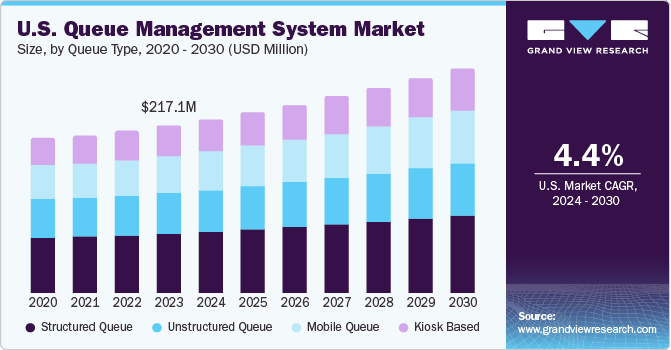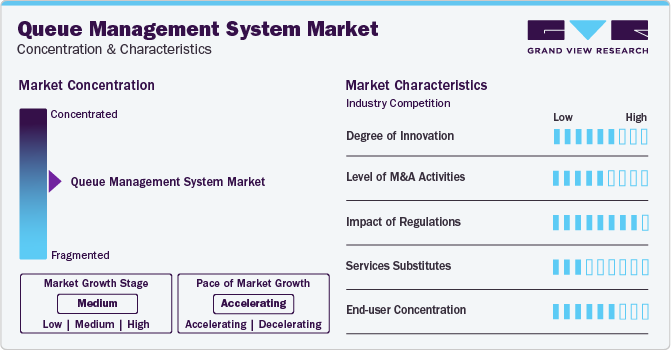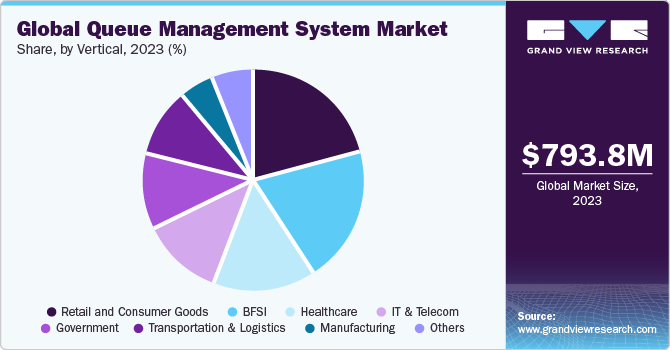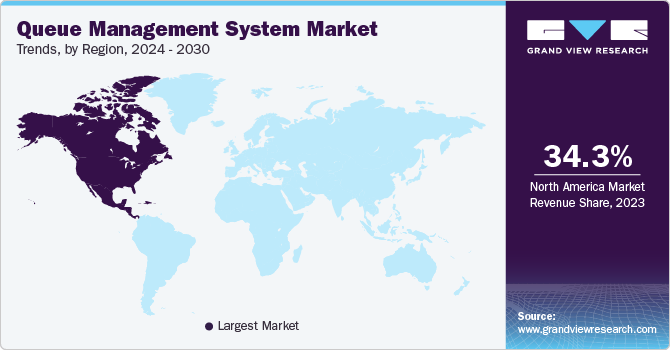
Queue Management System Market Size, Share & Trends Analysis Report By Offering, By Solution Type (Linear Queuing, Virtual Queuing), By Queue Type, By Deployment, By Enterprise Size, By Application, By Vertical, By Region, And Segment Forecasts, 2024 - 2030
- Report ID: GVR-4-68040-243-1
- Number of Report Pages: 140
- Format: PDF
- Historical Range: 2018 - 2023
- Forecast Period: 2024 - 2030
- Industry: Technology
Queue Management System Market Trends
The global queue management system market size was estimated at USD 793.8 million in 2023 and is projected to grow at a CAGR of 6.4% from 2024 to 2030. Factors such as the growing need to manage customer traffic and movement to increase customer engagement and improve productivity and employee efficiency are driving this growth. The increase in the demand for queue management in the healthcare sector is helping to improve patient experience and employee satisfaction with limited budgets and resources. Queue management systems (QMS) provide significant benefits in the healthcare industry by tracking patient journeys within hospitals and supporting hospitals to enhance the patient's entire visits, ranging from check-in to post-service.

A QMS is an automated system that manages lead services or customer flow. It deals with interactions with customers in person or through on-screen information. This system helps organizations manage many customers. It offers users a range of modules to handle customers’ requests efficiently. This sector allows businesses to accurately understand the inaccuracies in the queues and address these issues to maintain consistent positive customer responses.
Queue management system is extensively used in the public transportation networks. Using these systems across the network requires collective efforts from infrastructure providers, component manufacturers, service providers, and public sector groups. Hence, the efficient implementation of QMS requires a large funding from the entities.
The evolving technological world is witnessing the rapid proliferation of connected devices due to growing artificial intelligence and analytics trends. In the hospitality industry, these technologies offer an opportunity to improve visitor and guest security. Artificial intelligence (AI) and analytics technologies play an essential role in promoting the adoption of queue management systems. Analytics combines sensor data and calculations through data analytics to manage and control customer queues effectively.
Market Concentration & Characteristics
The market growth stage is high and the pace of the growth pace is accelerating. The rapid technological advancements drive innovation and continuous improvement in QMS. Emerging technologies such as artificial intelligence, machine learning (ML), blockchain, and cloud computing are increasingly integrated into data governance platforms, enabling enhanced automation, analytics-driven insights, and real-time monitoring capabilities.

The market has a fragmented nature, featuring several global and regional players. The industry players are investing in research & development (R&D) to develop advanced solutions and gain a competitive edge. They are also entering into partnerships and engaging in mergers & acquisitions as the market is characterized by innovation, disruption, and rapid change.
Offering Insights
The solution segment led with the largest revenue share of 62.5% in 2023 and is expected to continue its dominance from 2024 to 2030. The solution segment comprises various software and hardware components that work together to provide efficient and organized queue management. These solutions cater to different industries and specific requirements, aiming to streamline the process of managing queues and improving customer experience. These solutions work together to provide an efficient and seamless queue management experience for customers and businesses, ultimately driving growth of the queue management system market.
The services segment is anticipated to witness the fastest CAGR during the forecast period. The service segment includes various offerings that support the implementation, maintenance, and enhancement of queue management solutions. These services ensure smooth operations and optimal performance of the queue management systems. These service segments play a crucial role in successfully deploying and maintaining queue management systems, contributing to the market's growth.
Solution Insights
The linear queuing segment held the largest revenue share in 2023. Linear queueing systems typically involve a single line or path for people to wait in, with a clear beginning and end. The main goal of linear queueing is to manage the flow of customers or tasks efficiently and fairly, ensuring that each person or task is processed in the order they arrived.
The virtual queueing segment is expected to witness the fastest CAGR during the forecast period. This is attributed to the growing popularity and awareness of this advanced technology in developed countries. Virtual queue management systems help place customers in virtual waiting lines or queues that allow the customers to avail of the services without waiting in lines.
Queue Insights
The structured queue segment led with the largest revenue share in 2023 and is projected to grow at a significant CAGR from 2024 to 2030. The structured queue segment allows the management of the flow of customers or tasks in a more organized and targeted manner, ensuring that each person is directed to a suitable source. Structured queueing systems help streamline the process and direct the customers to the appropriate source by involving multiple services or counters. Several methods are involved in this segment, such as ticket distribution, automated ticket dispensers, dynamic routing, and analytics and reporting.
The mobile queue is expected to witness the fastest CAGR during the forecast period. This is due to the aim of mobile queueing systems to enhance the overall customer experience by reducing wait times, minimizing physical queues, and providing additional features and services to customers. These systems include mobile and web-based programs, location-based services, and analytics to improve customer experience.
Vertical Insights
The retail and consumer goods segment dominated the market in 2023. The retail and consumer goods segment primarily focuses on improving customer experience and streamlining operations within retail stores, shopping malls, and other consumer goods-related businesses. The adoption of queue management systems in this segment aims to address common pain points such as long waiting times, inefficient checkout processes, and crowded store environments. The companies such as QLess, Qmatic, IntuVision, VeeBeam, and WaitWell offer a range of solutions tailored to the specific needs of retail businesses, including virtual queuing, self-service kiosks, real-time updates, and analytics.

The healthcare segment is expected to grow significantly during the forecast period, owing to the key features queue management systems offer to customers in the healthcare segment. Factors such as enhanced patient efficiency, better resource utilization, and enhanced data analytics and collection drive the growth of this segment.
Deployment Insights
The cloud-based segment dominated the market in 2023. Cloud-based electronic booking allows visitors to book their trips in advance. QMS sends out notifications related to the itinerary. It has gained popularity due to its flexibility, scalability, and cost-effectiveness. It offers the advantage of scalability, allowing organizations to adapt to changes in demand quickly. Moreover, it eliminates the need for organizations to invest in expensive hardware, software, and maintenance.
The on-premises segment is expected to grow significantly during the forecast period. On-premises queue management systems are installed and operated within an organization's infrastructure, typically on servers or local networks. It provides control and security, customization and integration, stability and performance, and data ownership.
Enterprise Size Insights
The large enterprises segment dominated the market in 2023, as queue management in large enterprises is crucial for maintaining efficiency, enhancing customer satisfaction, and optimizing resource allocation. Large enterprises often serve a significant number of customers or clients. Queue management systems help reduce wait times, minimize frustration, and improve customer satisfaction by providing clear and transparent information about wait times, available services, and estimated service durations.
The SMEs segment is expected to grow significantly during the forecast period. SMEs typically need more resources like staff, equipment, and facilities. Effective queue management helps allocate these resources efficiently, ensuring they are utilized optimally.
Application Insights
The appointment management segment dominated the market in 2023. Queue management systems are increasingly used in appointment management to streamline processes, enhance efficiency, and improve the overall experience for patients and healthcare providers. These management systems can facilitate better appointment scheduling by providing insights into patient needs, appointment availability, and workload distribution. Moreover, it helps maintain a structured and organized patient flow, ensuring patients are diagnosed according to their scheduled appointments.
The real-time monitoring segment is expected to grow significantly during the forecast period, owing to its use in various industries, including healthcare, to ensure efficient operations, maintain high-quality services, and respond promptly to any issues that may arise.
Regional Insights
The North America queue management system market accounted for a 34.3% share in 2023, attributed to the ever-increasing population of the region. Moreover, in North America, many businesses and public services cater to many customers or clients. QMS help streamline these interactions, ensuring that services are delivered efficiently and effectively, reducing wait times, and enhancing overall customer satisfaction.
U.S. Queue Management System Market Trends
The U.S. accounted for over 34% of the global queue management system market in 2023 and is expected to grow significantly over the forecast period. This growth is attributed to the increasing population of the country. Moreover, the businesses and public services in the country often face high demand and competition. Queue management systems help optimally distribute resources, such as staff, equipment, and facilities, ensuring that they are utilized efficiently and that no time is wasted. Queue management systems are needed to optimize resource allocation, enhance customer experience, improve operational visibility, ensure scalability, streamline workflows, maintain compliance with regulatory requirements, and contribute to public health and safety.
Europe Queue Management System Market Trends
Europe was identified as a lucrative region in this industry. The region is home to diverse cultures and languages, making it crucial to provide a seamless and understandable experience for customers. Queue management systems can provide real-time information about wait times, available services, and estimated service durations, improving customer satisfaction and reducing frustration.

The queue management system market in the UK is expected to grow over the forecast period, due to the increasing number of various public and private organizations, such as hospitals, banks, post offices, and government agencies that serve many customers or clients daily. Queue management systems help these organizations manage customer flow, reduce wait times, and improve service delivery.
The France queue management system market is expected to grow over the forecast period due to the fact that, in France, people value their time and expect efficient and satisfactory service. Queue management systems help reduce wait times, minimize frustration, and improve customer satisfaction. By optimizing resource allocation and reducing wait times, queue management systems can reduce energy consumption and overall environmental impact. It is particularly relevant in a country like France, which has set ambitious goals to combat climate change and reduce greenhouse gas emissions.
The queue management system market in Germany is expected to grow over the forecast period, due to a diverse range of businesses, from small enterprises to large corporations. QMS can be easily scaled up or down to accommodate the varying demands of different organizations, ensuring that they can efficiently manage resources and maintain high-quality service levels.
Asia Pacific Queue Management System Market Trends
The queue management system market in Asia Pacific is anticipated to witness significant growth over the forecast period. This growth can be attributed to the high population density, which results in a substantial number of people seeking various services, such as banking, healthcare, or government services. QMS can help manage these large crowds more efficiently, reducing wait times and improving overall customer experience.
The queue management system market in China is expected to grow over the forecast period. China, the world's most populous country, experiences a high volume of people in various public spaces and services daily. Implementing QMS in China is crucial as China faces significant challenges in managing large crowds in public spaces, transportation hubs, and service centers. Queue management systems can help control and organize crowds, reducing congestion and ensuring public safety.
The Japan queue management system market is expected to grow over the forecast period. Japan is known for its efficiency, punctuality, and high-quality customer service. The country has a highly developed and efficient public transportation system. QMS help streamline processes like ticket purchasing, boarding, and managing crowds during peak hours, ensuring smooth operations and minimizing delays. Japanese society places a strong emphasis on discipline, punctuality, and orderliness. Queue management systems align with these values by promoting organized and efficient queuing, reducing confusion, and minimizing conflicts among individuals.
The queue management system market in Saudi Arabia is expected to grow over the forecast period. Saudi Arabia has experienced significant population growth and urbanization in recent years. It has increased demand for services in various sectors, such as healthcare, banking, government services, and retail. Queue management systems help manage these increased demands, reducing wait times and improving overall customer experience. Moreover, Saudi Arabia is developing rapidly and launching new projects and initiatives regularly. Queue management systems can be scaled up or down to accommodate these changes, ensuring organizations can efficiently manage resources.
Key Queue Management System Company Insights
Some of the key players operating in the market include Advantech, Wavetec, Aurionpro, and Lavi Industries
-
Advantech's intelligent queue management system enables business owners to shorten queues and reduce customer waiting times, improving operational efficiency and service quality. An intelligent queue management system allows customers to access the queue and check the status online easily.
-
Wavetec's queue management systems are designed to manage customer flow by improving process optimization and wait time reduction, streamlining the queuing experience. By integrating QMS technologies such as ticket dispensers, kiosks, call forwarding, and an automated scheduling system, customers will have a more relaxed waiting experience.
QLess and Qmatic are some of the other market participants.
-
QLess is a leading provider of innovative queue management solutions that aim to improve customer experience, streamline operations, and increase efficiency across various industries. The company offers a comprehensive suite of services and technologies designed to help businesses manage their queues more effectively, reduce wait times, and enhance overall customer satisfaction.
-
Qmatic is a leading global provider of queue management solutions. It offers a comprehensive range of products and services to help businesses streamline their operations, improve customer experience, and increase efficiency across various industries.
Key Queue Management System Companies:
The following are the leading companies in the queue management system market. These companies collectively hold the largest market share and dictate industry trends.
- Advantech
- Wavetec
- Aurionpro
- Lavi Industries
- QLess
- QMatic
- SEDCO
- Q-nomy
- Core Mobile
- MaliaTech
Recent Developments
-
In July 2023, Alizz Islamic Bank announced a collaboration with Dubai, UAE-based queue management solution provider SEDCO to implement SEDCO's Advanced Queue Management Solution. With this solution, Alizz Islamic Bank aims to enhance customer experience by optimizing customer flow and operations.
-
In March 2023, QMatic group launched a mobile ticket allowing customers to join a queue via text. This launch aimed to offer quick, easy, and convenient use of text message queuing.
-
In February 2023, Orabank Gabon collaborated with GBM to adopt SEDCO's virtual queue management solutions. It was aimed at opening new branches to reduce customers' waiting times.
Queue Management System Market Report Scope
|
Report Attribute |
Details |
|
Market size value in 2024 |
USD 839.1 million |
|
Revenue forecast in 2030 |
USD 1.22 billion |
|
Growth rate |
CAGR of 6.4% from 2024 to 2030 |
|
Base year for estimation |
2023 |
|
Historical data |
2018 - 2022 |
|
Forecast period |
2024 - 2030 |
|
Quantitative units |
Revenue in USD million and CAGR from 2024 to 2030 |
|
Report coverage |
Revenue forecast, company ranking, competitive landscape, growth factors, and trends |
|
Segments covered |
offering, solution type, queue type, deployment, enterprise size, application, vertical, region |
|
Regional scope |
North America; Europe; Asia Pacific; Latin America; MEA |
|
Country scope |
U.S.; Canada; UK; Germany; France; China; India; Japan; South Korea; Australia; Brazil; Mexico; UAE; Saudi Arabia; South Africa |
|
Key companies profiled |
Advantech; Wavetec; Aurionpro; Lavi Industries; QLess; QMatic; SEDCO; Q-nomy, Core Mobile; MaliaTech |
|
Customization scope |
Free report customization (equivalent up to 8 analyst’s working days) with purchase. Addition or alteration to country, regional, and segment scope |
|
Pricing and purchase options |
Avail customized purchase options to meet your exact research needs. Explore purchase options |
Global Queue Management System Market Report Segmentation
This report forecasts revenue growth at global, regional, and country levels and provides an analysis of the latest vertical trends in each of the sub-segments from 2018 to 2030. For this report, Grand View Research has segmented the global queue management system market research report based on offering, solution type, queue type, deployment, enterprise size, application, vertical, and region:
-
Offering Outlook (Revenue, USD Million, 2018 - 2030)
-
Services
-
Solution
-
-
Solution Type Outlook (Revenue, USD Million, 2018 - 2030)
-
Linear Queuing
-
Virtual Queuing
-
-
Queue Type Outlook (Revenue, USD Million, 2018 - 2030)
-
Structured Queue
-
Unstructured Queue
-
Mobile Queue
-
Kiosk Based
-
-
Deployment Outlook (Revenue, USD Million, 2018 - 2030)
-
Cloud - based
-
On- premises
-
-
Enterprise Size Outlook (Revenue, USD Million, 2018 - 2030)
-
SMEs
-
Large Enterprises
-
-
Application Outlook (Revenue, USD Million, 2018 - 2030)
-
Appointment Management
-
Query Handling
-
Workforce Optimization
-
Reporting and Analytics
-
Real-time Monitoring
-
Others
-
-
Vertical Outlook (Revenue, USD Million, 2018 - 2030)
-
BFSI
-
Retail & Consumer Goods
-
Government
-
Healthcare
-
Manufacturing
-
Telecom and IT
-
Transportation & Logistics
-
Other
-
-
Regional Outlook (Revenue, USD Million, 2018 - 2030)
-
North America
-
U.S.
-
Canada
-
-
Europe
-
UK
-
Germany
-
France
-
-
Asia Pacific
-
China
-
India
-
Japan
-
South Korea
-
Australia
-
-
Latin America
-
Brazil
-
Mexico
-
-
Middle East & Africa
-
UAE
-
Saudi Arabia
-
South Africa
-
-
Frequently Asked Questions About This Report
b. The global queue management system market size was estimated at USD 793.8 million in 2023 and is expected to reach USD 839.1 million in 2024
b. The global queue management system market is expected to grow at a compound annual growth rate of 6.4% from 2024 to 2030 to reach USD 1.22 billion by 2030.
b. The structured queue segment led the market with the largest revenue share in 2023 and is projected to grow at a significant CAGR over the forecast period. The structured queue segment allows the management of the flow of customers or tasks in a more organized and targeted manner, ensuring that each person is directed to a suitable source.
b. Some key players operating in the queue management system market include Advantech; Wavetec; Aurionpro; Lavi Industries; QLess; QMatic; SEDCO; Q-nomy, Core Mobile; MaliaTech
b. The growing need to manage customer traffic and movement to increase productivity and the growing need to improve employee efficiency and increase customer engagement are the major factors driving the market's growth.
We are committed towards customer satisfaction, and quality service.
"The quality of research they have done for us has been excellent."




